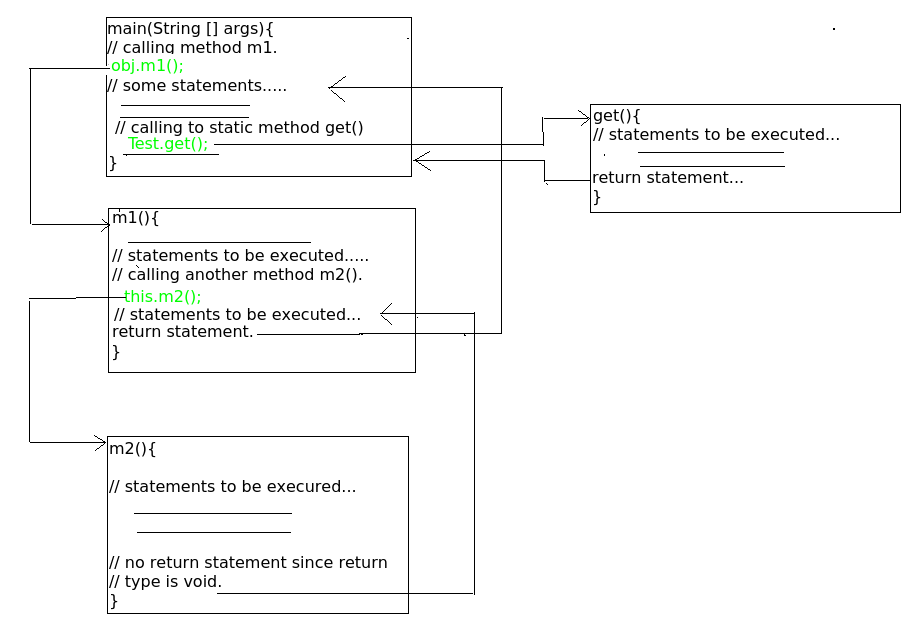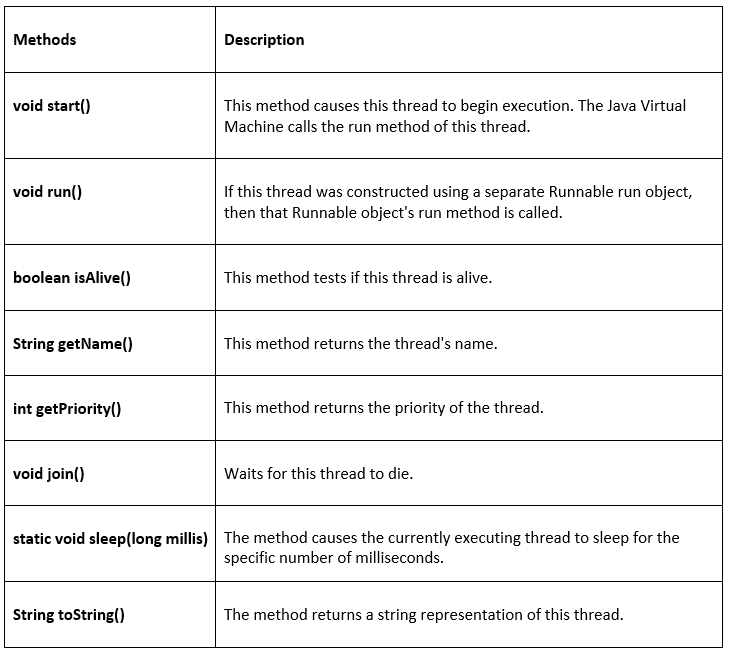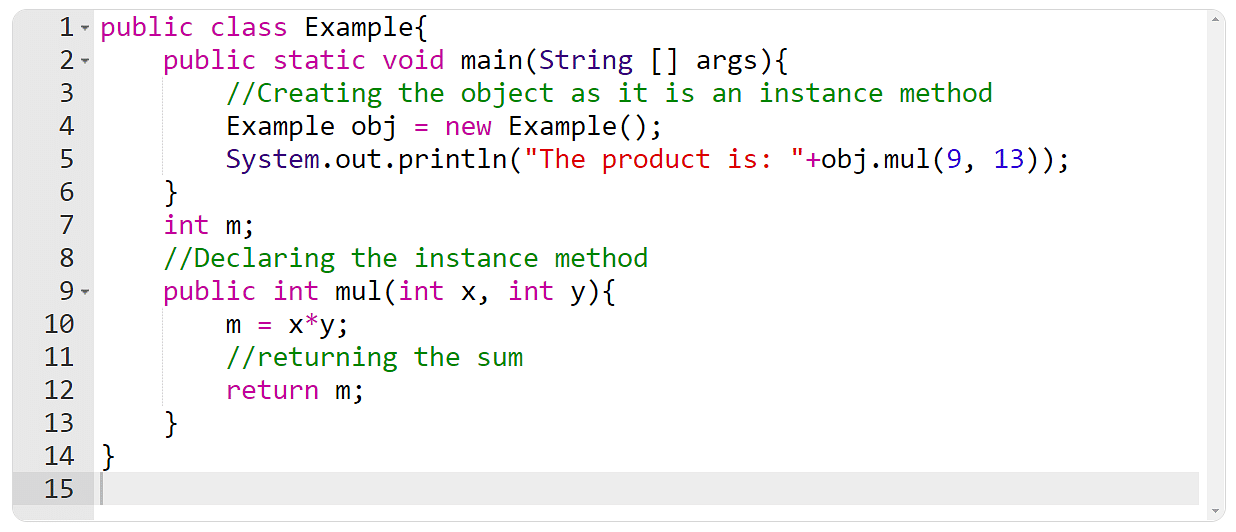Methods In Java
Methods In Java - Is it optional or there are situations when one needs to use it obligatory? In java, are there clear rules on when to use each of access modifiers, namely the default (package private), public, protected and private, while making class and interface and dealing with. A getter for foo is called getfoo and the setter is. The only thing that makes them getters or setters is convention. Super can be used to refer to the immediate parent class instance. The only situation i have encountered is when in the class you invoke. Instead of accessing class member variables directly, you define get methods to access these variables, and set methods to. What about using this with methods in java? Set and get methods are a pattern of data encapsulation. In java getters and setters are completely ordinary functions.
The super keyword in java is a reference variable that is used to refer to the immediate parent class object. Set and get methods are a pattern of data encapsulation. The only situation i have encountered is when in the class you invoke. A getter for foo is called getfoo and the setter is. In java getters and setters are completely ordinary functions. Instead of accessing class member variables directly, you define get methods to access these variables, and set methods to. What about using this with methods in java? The only thing that makes them getters or setters is convention. Super can be used to refer to the immediate parent class instance. In java, are there clear rules on when to use each of access modifiers, namely the default (package private), public, protected and private, while making class and interface and dealing with.
The only situation i have encountered is when in the class you invoke. Set and get methods are a pattern of data encapsulation. Is it optional or there are situations when one needs to use it obligatory? In java, are there clear rules on when to use each of access modifiers, namely the default (package private), public, protected and private, while making class and interface and dealing with. Super can be used to refer to the immediate parent class instance. Instead of accessing class member variables directly, you define get methods to access these variables, and set methods to. The super keyword in java is a reference variable that is used to refer to the immediate parent class object. The only thing that makes them getters or setters is convention. In java getters and setters are completely ordinary functions. What about using this with methods in java?
How Do You Create Two Methods In Java? The 20 New Answer
What about using this with methods in java? Instead of accessing class member variables directly, you define get methods to access these variables, and set methods to. A getter for foo is called getfoo and the setter is. Is it optional or there are situations when one needs to use it obligatory? In java, are there clear rules on when.
trustedbpo Blog
In java getters and setters are completely ordinary functions. Set and get methods are a pattern of data encapsulation. In java, are there clear rules on when to use each of access modifiers, namely the default (package private), public, protected and private, while making class and interface and dealing with. The only situation i have encountered is when in the.
Methods in Java
Set and get methods are a pattern of data encapsulation. A getter for foo is called getfoo and the setter is. The only situation i have encountered is when in the class you invoke. In java, are there clear rules on when to use each of access modifiers, namely the default (package private), public, protected and private, while making class.
Introduction to Accessor Methods in Java YouTube
The only thing that makes them getters or setters is convention. Is it optional or there are situations when one needs to use it obligatory? Super can be used to refer to the immediate parent class instance. Instead of accessing class member variables directly, you define get methods to access these variables, and set methods to. A getter for foo.
JavaLeafProgramming Methods in Java
What about using this with methods in java? In java getters and setters are completely ordinary functions. Set and get methods are a pattern of data encapsulation. In java, are there clear rules on when to use each of access modifiers, namely the default (package private), public, protected and private, while making class and interface and dealing with. Instead of.
Java collections cheat sheet. All java collections overview… by
Is it optional or there are situations when one needs to use it obligatory? What about using this with methods in java? In java getters and setters are completely ordinary functions. Super can be used to refer to the immediate parent class instance. In java, are there clear rules on when to use each of access modifiers, namely the default.
Java Threading Studyopedia
The only thing that makes them getters or setters is convention. Super can be used to refer to the immediate parent class instance. A getter for foo is called getfoo and the setter is. What about using this with methods in java? In java, are there clear rules on when to use each of access modifiers, namely the default (package.
Java String Methods Complete List with Examples
Instead of accessing class member variables directly, you define get methods to access these variables, and set methods to. The only situation i have encountered is when in the class you invoke. Is it optional or there are situations when one needs to use it obligatory? Super can be used to refer to the immediate parent class instance. The only.
Instance In Java
The super keyword in java is a reference variable that is used to refer to the immediate parent class object. Is it optional or there are situations when one needs to use it obligatory? A getter for foo is called getfoo and the setter is. In java, are there clear rules on when to use each of access modifiers, namely.
Methods in Java Java Methods Java Class Methods
What about using this with methods in java? The only situation i have encountered is when in the class you invoke. In java getters and setters are completely ordinary functions. The only thing that makes them getters or setters is convention. The super keyword in java is a reference variable that is used to refer to the immediate parent class.
In Java, Are There Clear Rules On When To Use Each Of Access Modifiers, Namely The Default (Package Private), Public, Protected And Private, While Making Class And Interface And Dealing With.
In java getters and setters are completely ordinary functions. Is it optional or there are situations when one needs to use it obligatory? The only thing that makes them getters or setters is convention. The only situation i have encountered is when in the class you invoke.
Instead Of Accessing Class Member Variables Directly, You Define Get Methods To Access These Variables, And Set Methods To.
Set and get methods are a pattern of data encapsulation. A getter for foo is called getfoo and the setter is. The super keyword in java is a reference variable that is used to refer to the immediate parent class object. What about using this with methods in java?









